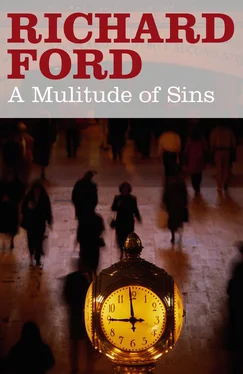“I wish I’d considered it that long ago,” Tom said. He was wearing tan shorts, wool socks, a red Bean’s canvas shirt and running shoes. They were dressed almost alike, though she had a blue anorak and khaki trousers. Tom looked like a tourist, not an ex-cop, which, she guessed, was the idea. Tom liked the idea of transforming yourself.
“A vacation is not to regret things, or even to think about things permanently.” She tugged his arm. She felt herself being herself on his behalf. The street through town— Route 1—was already getting crowded, the bridge traffic slowing to a creep. “The idea of a vacation is to let your spirits rise on the breeze and feel unmoored and free.”
Tom looked at her as though she’d become the object of his longing. “Right,” he said. “You’d make somebody a great wife.” He looked startled for saying that and began walking away as if embarrassed.
“I am somebody’s wife,” she said, coming along, trying to make it a joke, since he’d meant something sweet, and nothing was harmed. It was just that whatever was wrong between them caused unexpected events to point it out but not identify it. They loved each other. They knew each other very well. They were married people of good will. Everything was finally forgivable — a slip of the tongue, a botched attempt at lovemaking, a conversation that led nowhere or to the wrong place. The question was: what did all these reserves of tender feeling and kind regard actually come to ? And not come to? Walking down the hill behind her husband, she felt the peculiar force of having been through life only once. These three days were to determine, she understood, if anything more than just this minimum made sense. It was an important mystery.
Inside the Miss Wiscasset Diner, Nancy perused The Down-East Pennysaver , which had a dating exchange on the back page. Men seeking women. Women seeking men . Nothing else was apparently permissible. No Men seeking men . Tom studied the map they’d picked up in the B&B, and which contained a listing of useful “Maine Facts” in which everything occasioned an unfunny variation on the state name: Maine Events. Mainely Antiques. Mainiac Markdowns. Maine-line Drugs. Roof Maine-tenance. No one seemed able to get over what a neat name the place had.
Out on the river, a black metal barge was shoving a floating dredger straight up the current. The dredger carried an immense bucket suspended on a cable at the end of an articulated boom. The whole enterprise was so large as to seem ridiculous.
“What do you suppose that’s for?” Nancy said. The diner was noisy with morning customers and contained a teeming greasy-bacon and buttery-toast smell.
Tom looked up from his map out at the dredger. It would not get past the bridge where Route 1 crossed the river. It was too tall. He looked at her and smiled as though she hadn’t said anything, then went back to his “Maine Facts.”
“If you’re interested, all the women seeking men are either ‘full-figure gals over fifty,’” she said, forgetting her question, “or else they’re sixteen-year-olds seeking mature ‘father figures.’ The same men get all the women in Maine.”
Tom took a sip of his coffee and knitted his brows. They had until Sunday, when they were flying out of Bangor. They knew nothing about Maine, but had discussed a drive to Bar Harbor and Mount Katahdin, which they’d heard were pretty. Nancy had proposed to visit the national park, a bracing hike, then maybe a swim in the late-lasting-summer ocean if it wasn’t too frigid. They’d imagined leaves would be turning, but they weren’t yet because of all the summer rain.
They were also not able to tell exactly how far anything was from anything else. The map was complicated by quirky peninsulas extending back south and the road having to go up and around and down again. The morning’s drive from Freeport had seemed long, but not much distance was covered. It made you feel foreign in your own country. Though they’d always found happiness inside an automobile — as far back as when Tom played drums in a college rock band and she’d gone along on the road trips, sleeping in the car and in ten-dollar motels. In the car, who they really were became available to the other. Guards went down. They felt free.
“There’s a town called Belfast,” Tom said, back to his map. “It’s not far up. At least I don’t think it is.” He looked back at where the floating dredger was making its slow turn in the river, beginning to ease back toward the ocean. “Did you see that thing?”
“I don’t get what ‘down-east’ means,” Nancy said. Everything in the Pennysaver that wasn’t a play on “Maine” had “down-east” somehow attached to it. The dating exchange was called “Down-East In Search Of.” “Does it mean that if you follow one of the peninsulas as far as you can go south, you get east?”
This was a thing Tom should know. It was his idea to come here instead of the Eastern Shore place they liked. Maine had all of a sudden “made sense” to him — something hazy about the country having started here and the ocean being “primary” among experiences, and his having grown up near Lake Michigan and that never seeming remotely primary.
“That’s what I thought it meant,” Tom said.
“So what does Maine mean? Maine what?” she asked. Nothing was in the Pennysaver to explain anything.
“That I do know,” Tom said, watching the barge turning and starting back downstream. “It means main land . As opposed to an island.”
She looked around the crowded diner for their waitress. She was ready for greasy bacon and buttery toast and had wedged the Pennysaver behind the napkin dispenser. “They have a high opinion of themselves here,” she said. “They seem to admire virtues you only understand by suffering difficulty and confusion. It’s the New England spirit I guess.” Tom’s virtues, of course, were that kind. He was perfect if you were dying or being robbed or swindled — a policeman’s character traits, and useful in many more ways than policing. “Isn’t Maine the state where the woman was shot by a hunter while she was pinning up clothes on the line? Wearing white gloves or something, and the guy thought she was a deer? You don’t have to defend that, of course.”
He gave her his policeman’s regulation blank stare across the table top. It was an expression his face could change into, leaving his real face — normally open and enthusiastic — back somewhere forgotten. He took injustice personally.
She blinked, expecting him to say something else.
“Places that aren’t strange aren’t usually interesting,” he said solemnly.
“It’s just my first morning here.” She smiled at him.
“I want us to see this town Belfast.” He reconsulted the map. “The write-up makes it seem interesting.”
“Belfast. Like the one where they fight?”
“This one’s in Maine, though.”
“I’m sure it’s wonderful.”
“You know me,” he said, and unexpectedly smiled back. “Ever hopeful.” He was an enthusiast again. He wanted to make their trip be worthwhile. And he was absolutely right: it was too soon to fall into disagreement. That could come later.
Early in the past winter Tom had moved out of their house and into his own apartment, a grim little scramble of white, dry-walled rectangles which were part of a new complex situated across a wide boulevard from a factory-outlet mall and adjacent to the parking lot of a large veterinary clinic where dogs could be heard barking and crying day and night.
Tom’s departure was calculatedly not dramatic. He himself had seemed reluctant, and once he was out, she was very sorry not to see him, not to sleep next to him, have him there to talk to. Some days she would come home from her office and Tom would be in the kitchen, drinking a beer or watching CNN while he heated something in the microwave — as though it was fine to live elsewhere and then turn up like a memory. Sometimes she would discover the bathroom door closed, or find him coming up from the basement or just standing in the back yard staring at the hydrangea beds as if he was considering weeding them.
Читать дальше












